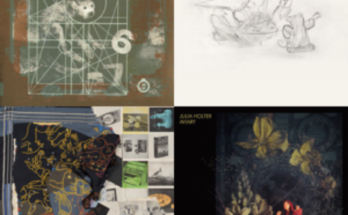Our neighbors from the north have given so much to our American culture. Canada has given us comedians like Dan Aykroyd, Mike Myers and Phil Hartman, television game show hosts like Alex Trebek and athletes like Steve Nash. But with acts such as Sum 41, Avril Lavigne and Celine Dion all from Canada, it’d seem like the country is lacking in the musical department. Since the mid-’90s, however, the country – and particularly the city of Montreal – has been pumping out some alternative independent music that beats the pants off of anything coming from the States. Wolf Parade and the world-renowned Arcade Fire are just two products of Montreal’s scene. A more sprawling and interesting example, though, is the intertwining and overlapping of bands associated with the collective Broken Social Scene. Founded by Kevin Drew and Brendan Canning in 1999, the band has become the glue of Montreal’s music scene; a scene that has continually been churning out acclaimed acts. Here it is –
-Brian McGovern
Memphis
-Erin Gillman
“Being a musician is like living the life of an 18-year-old high school dropout. I mean, why be in rock and roll otherwise? You might as well just get a job.”
Torquil Campbell, musician and singer for the bands Memphis and Stars, admits to waking up late, eating a little something, spending a few hours doing whatever he fancies and starting it up all over again the next day. Don’t let him fool you into thinking he doesn’t work hard – though Memphis debuted in August of 2004, and Stars released their fifth album in 2005.
Campbell grew up in beautiful Toronto, Canada and spent the better part of his college days perfecting his now famous melodramatic style of music. The shy boy from Canada was unrelentingly polite and charming as he explained the surreal dream it is to travel through countries making music with his best friends.
“Music was an excuse to hang out and have a good time together, so we had the opportunity, and that’s what we did.”
Any excuse to pal around all day is a good one, especially if it ends in highly acclaimed musical pieces and sold-out concerts all over the world. The birth of Memphis may have been lighthearted and playful, but Torq and Chris Dumont are getting some serious recognition for their breezy songs and laid-back demeanor.
“Memphis is a simpler, more low-key feeling than Stars, which is five people all together trying to make music.” The two-man band may be only an infant in the eyes of the music industry, but the combined wisdom and intellect of both men is profound enough to help Memphis grow and mature.
They may admittedly be boys at heart, but they’ve spent their fair share of time perfecting the craft of music. Torq has been playing music since his school days and writing music since he was around 20 years old. When Stars left New York for Vancouver, Chris Dumont stuck around and worked at the Metropolitan Opera as a non-singing actor. During the summer, he took off of work to spend time in Vancouver writing quiet declarations of love, which would soon blossom into the songs of Memphis.
“The best shows I’ve ever played have been the ones with about 30 people there, most of whom were us. I love the shows that we played when nobody gave a shit and we were cheering each other on. There was a wonderful sense of being so sure that your friends were so talented and had so much to offer and feeling like you were in on this fabulous secret that eventually you would have to give up. Those shows mean the most to me.”
Stars and Memphis are two of those wonderful little secrets we can’t wait to hear. Their music is like a love letter — licked, sealed and sent far away, waiting to be torn open by an ever-gracious recipient on the other end of the line. There’s a sweet sadness behind their dainty music and the same milky tone of a musician far from home. Each album is a lullaby, a whispered anthem of friendship and love. Spending the summer on a lake with his lovely wife will surely lend a hand in inspiring the dapper Scottish man named Torq, but then it’s back to business as an 18-year-old high school dropout. If only we were all so lucky.
Apostle of Hustle
By Brian McGovern
After an inspiring two-month trip to Cuba, Andrew Whiteman, lead guitarist for Broken Social Scene, started a new musical project incorporating all the music he took in during his stay. Absorbing the Latin and Cuban music culture as well as learning a 3-stringed guitar called the tres, Whiteman came back to Canada and formed Apostle of Hustle.
The trio’s first record, Folkloric Feel, came out in 2004 with critical acclaim. Arts and Crafts record label released the band’s sophomore album, National Anthem of Nowhere, this past February. Andrew Whiteman, while driving to Chicago for the start of their tour with Andrew Bird, talked about how more than Latin music or Montreal connections, Apostle of Hustle is about appreciating and embracing the music they love.
“Well we are …” Whiteman hesitates for a moment over the phone, “In the band, we’re music nerds.”
Not strictly limiting themselves to a particular style or aesthetic, Apostle of Hustle could be seen as a pot for mixing a variety of sounds and ideas.
“It was a good place to make a mash up, [but] we do gravitate to world music,” he said.
Within the realm of world music, Whiteman explained the writing process for the band simply as a sort of ‘stealing.’ Gleaning could be a more accurate description, particularly when listening to Folkloric Feel’s track of the same name.
“We start with something we steal, and turn it into something else,” Whiteman casually and unapologetically said. “We’ll have a rhythmic or melodic phrase somewhere, [and] we think no one will catch it.”
The same can be seen in Whiteman’s other project, Broken Social Scene. The track “Hotel” started as a remix of one of Feist’s songs. Through variations and adaptations, what comes is something totally new. The result in Apostle of Hustle’s work is also something totally new and rich, though it retains a familiar and simple root. Just like BSS, Whiteman’s project relies heavily on collaboration, and a bit of substance abuse.
“A lot of our songs started … in the bedroom of my house, and we’d be super high,” he said. “Julian and Dean would come over and get that stuff done.”
The jams and demos they assembled were then taken to Montreal and worked on in the studio. For the new record, the only guidelines Whiteman set were louder vocals and more percussion. A lot of the record also came from, as Whiteman put it, “drinking about four bottles of red wine every night.”
Apostle of Hustle is a band that wears their influences on their sleeve; a rare thing seen in indie culture. Not presenting themselves as pretentious genius, Whiteman and the gang are appreciators but also brilliant artists. Just in titles and lines of songs, Apostle of Hustle mentions both Manu Chao and Victor Jara, two prominent world and folk singers. This love for music and collaborative nature, with Leslie Feist and other Montreal musicians appearing through National Anthem, really make Apostle of Hustle a different kind of band. They are, in the purest sense, all about the music.
Feist The Reminder
By Brian McGovern
Leslie Feist, member of Broken Social Scene, has made a name for herself that has surpassed that of the Montreal supergroup. The Reminder, her third solo album and major label debut, will only take her monosyllabic self to new depths of popularity. Released this past Tuesday, her new record serves not as a reminder but a proclamation that Leslie Feist is the best contemporary female artist and even, arguably and androgynously, the best artist of recent memory. With a diverse sound, great songwriting and an always breathtaking voice, Feist has put out one of the best records of 2007 thus far.
Whether it is the coffee shop-ready opener “So Sorry” or the raucous hand-clapper “Sea Lion Woman,” each song exhibits a surprising sonic depth. This depth is what makes the record so great because it doesn’t rely on the amazing vocals of the artist. If the whole album consisted only of Feist’s voice and a piano, it would still be engaging and beautiful to listen to, but the instrumentation and arrangement makes Feist’s music so much more than the voice that is singing it.
The vibraphone and upright bass in “The Water” and the brilliant integration of strings and subtle banjo in “1 2 3 4” are just examples of the effort that was put in this record to come up with a diverse and unique sound. The various hand claps and finger snaps found through out the record also adds to a decisive Feist sound; a sound that feels both natural and authentic while still being pop-a-licious.
Strangely different than her breakout record Let It Die, Feist’s new direction is greatly welcomed. Her previous release was great, but The Reminder swims out into new waters. Stepping out of adult contemporary and reaching out to rock and folk, Feist’s talents are hard to ignore. This will be the record that will slowly move from iPod to iPod all summer.
Grade: A



